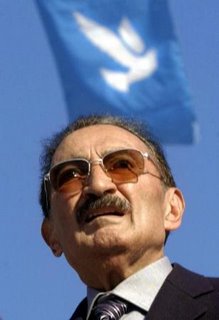 Bülent Ecevit, poet, journalist, and five times prime minister, died last night after a six-month coma. He was 81. Succeeded by his wife, Rahşan Ecevit, and his now greatly diminished Democratic Left Party, he leaves behind perhaps the greatest career in Turkish politics since Atatürk.
Bülent Ecevit, poet, journalist, and five times prime minister, died last night after a six-month coma. He was 81. Succeeded by his wife, Rahşan Ecevit, and his now greatly diminished Democratic Left Party, he leaves behind perhaps the greatest career in Turkish politics since Atatürk.His tragedy is that he will be remembered not for his achievements, of which there were many, but for the disasters that occurred during his time in power. In 1974, during his first tensure as prime minster, it was he who ordered the invasion of Cyprus by Turkish troops in response to a Greek-backed coup. He resigned shortly afterwards in an attempt to take his rocketing domestic popularity to an election, but was surprisingly not granted a request to dissolve parliament. Instead, his staunch rival Süleyman Demirel became prime minister. Condemned to oppositon, he was held responsible for the poverty and isolation that struck Turkey as a result of international sanctions.
He returned to office several times after 1977, but was not in office at the time of the 1980 military coup. He was imprisoned and banned from politics all the same, his Republican Left Party (CHP) closed down along with all others. But he continued his political life nonetheless through his wife, launching a new party, the Democratic Left Party (DSP). When his suspension expired, he took the helm himself, refusing calls to merge with a reinvigorated CHP. In the medium term, it turned out to be a shrewd move: while the CHP did quickly return to power in coalition led by Demirel in the early 1990s, it was the DSP who won power in 1999, with Ecevit back in charge after twenty years.
His last term in power was not a happy one. Disaster first struck in August 1999 with a devastating earthquake in northwestern Turkey. Over 20,000 people died in what was considered the country's richest, most properous region. And in 2001, an infamous row with the Turkish president triggered one of the worst economic crises in the country's history. The economy shrank by 10 percent, tens of thousands of jobs were lost, countless more savings rendered worthless. It was a crisis from which he would never recover; his refusal to resign over health grounds in 2002 was simply the last straw.
By dismissing any chance of left-wing unity and campaigning instead as a leader not tainted by corruption, Ecevit did secure his return to power. But his failure to tackle corruption while in power, and his refusal to accept a left coalition even in the wake of an electoral threat from the mildly Islamic Justice and Development Party was to be his downfall. The CHP was returned to parliament as the main opposition; the DSP became little but a fringe party.
But Bülent Ecevit is unjustly associated with shame alone, whereas his achievements were many and will largely go unrecognised. It was he who managed to defy what was in effect the theocracy of Ismet Inönü, toppling Atatürk's ailing right-hand man in a leadership contest in 1973. Despite the disasters that shook his terms in power, he managed to maintain an honest personal image, with his trademark black cap and refusal to be driven around in anything more glamourous than a Renault Safrane. Even President Sezer, the other half of that blistering row in 2001, today praised his politeness. "He was an example," Mr Sezer said, "with his democratic position and intellectual indentity".
Turkey woke up today to newspapers carrying the same picture, that of Ecevit holding a white dove at an election rally. The dove, a universal symbol of purity, was the symbol of his party and the symbol associated with his character. "A dove takes flight" was Hürriyet's headline, Vatan went with the splash "Goodbye, Karaoğlan", using Ecevit's popular nickname.
The head of Radikal's Ankara desk, Murat Yetkin, was on NTV a little while ago, calling him "one of the four or five greatest figures in Turkish history, alongside Atatürk and İnönü and Demirel". There are few who could disagree with that. The legacy may still be in contention, but there's no denying a legend left this world last night.
Bülent Ecevit, former Turkish prime minister. Born May 28 1925, died November 5th 2006.
Image © Copyright Hürriyet archives, 2006.


No comments:
Post a Comment